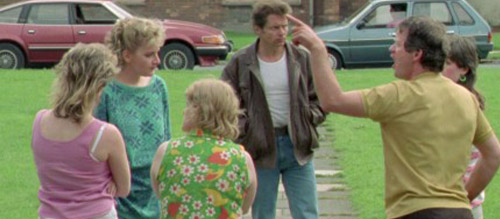Rita, Sue and Bob Too (1987) Review
Rita, Sue and Bob Too (1987)
Director: Alan Clarke
Screenwriter: Andrea Dunbar
Starring: Michelle Holmes, Siobhan Finneran, George Costigan, Lesley Sharp
With the strapline “Thatcher’s Britain with her knickers down” and the premise of two school girls who have an affair with a married man, it would be easy to dismiss Rita, Sue and Bob Too as a corny 80s film about the looseness of the working class, but anyone who has seen a Yorkshire-set working class drama will tell you that any film set in the county is bound to have something more substantial underneath the surface.
Based on the play of the same name and written by infamous playwright Andrea Dunbar, Rita, Sue and Bob Too is a film with a sordid premise, but is written from the realist tradition, allowing for an exploration of class, gender, race and morality, all while being genuinely funny.
The film is one that is striking from its very opening shot. Director Alan Clarke (Scum) tracks Sue’s Father as he stumbles home drunk from the local pub, The Beacon, and crosses his daughter, the titular Sue (Holmes). Here, the camera latches onto Sue, following her as she walks from her house to Rita’s (Finneran) and then onto Bob’s (Costigan) and Michelle’s (Sharp). Set and shot in Bradford, we are taken from the Buttershaw council estate in which screenwriter Dunbar was raised, to Baildon; from an under-class/working-class community to a much more middle class housing estate, where tightly joined flats in a high-rise are swapped for detached homes with garages – the ultimate sign of wealth in Thatcher’s Britain. When the girls enter the house, Madness’ “House of Fun” plays, the lyrics “Welcome to the house of fun, now you’ve come of age” acting as both an indication of the less stressful lives of the wealthy couple Rita and Sue act as babysitters for, as well as a signifier for what’s to come of the location in the coming narrative. This moment is perhaps the first true indication of the film’s intention to unravel class, gender and “normalised” british culture too, indicating how intelligently put together the film will be from this point on.
Mostly it’s the humour that keeps Rita, Sue and Bob Too from becoming sordid – the sex in the film truly is the least sexy sex of all time. In one scene, Rita shouts “It’s like a frozen sausage” and complains that she’s bored. Although clearly morally wrong, the humour passes off the issue of a (supposedly) 26 year old married man sleeping with two 15 year old school children as something that just seems to happen for children of such backgrounds, the comedy pierced by a sadness that haunts the film for its entire runtime. Retrospectively, this is much worse when you realise that George Costigan (who played Bob) was 40 when the film was released, and that at no stage do Alan Clarke or Dunbar work to reassure you that his character is much younger than he looks.
The film’s pivotal argument (the one that you’re likely to have seen in clips of this film even if you’ve never watched the entire thing), also features this same comedic technique, with members of Sue’s home Buttershaw estate joining in on the incredibly personal argument from the windows of their flats, jibing and laughing at the members of the families whose lives have been upended, one even claiming the drama to be “better than ‘Match of the Day'”. For anyone who has ever lived in such an environment or regularly visited such a place, it’s amazing how realistic this scene feels – the dialogue is exceptionally naturalistic, as are the performances (both audibly and physically), and while the scene does garner a few laughs, it is dosed in the same grim reality as the rest of the film, hooking it onto a sadness that you can’t ever quite get away from, just as the characters themselves cannot.
The only thing that stops this from being a perfect film is how it seems to walk away from some of its playwright’s most testing and ultra-realist sensibilities – particularly the characterisations of Rita and Sue. Presented somewhat as silly schoolgirls, conversations between them are limited to when they can next get ‘a jump’ (sex) with Bob, and the film’s somewhat Hollywoodised ending for the two characters was one that famously did not align with the original stage play nor sit well with the Dunbar family. Despite this, the girls do not lack agency, and the film does a decent job of portraying working class Bradford somewhat authentically, though this too has something of a Hollywood shine to it.
Overall, Rita, Sue and Bob Too is an important British film despite its minor issues, and one that is particularly well representative of a particular time and place. It does not allow itself to become ‘poverty porn’ like a lot of films about such a place, time and people has so often become, instead treating its characters with all the love, respect and authenticity of the real people that inspired Dunbar’s original play. If ever there was a classic of cinema to come from Yorkshire, it would be in this hyper naturalistic working class northern comedy/drama, Rita, Sue and Bob Too.
22/24
[DISPLAY_ULTIMATE_SOCIAL_ICONS]



Superb review and contemporary reflection of this film (one of my absolute favourites since being a teenager)